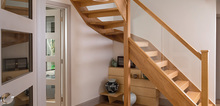When it comes to home or commercial interior design, bespoke stairs offer a unique way to blend practicality with style. Unlike mass-produced staircases, bespoke options are custom-built to fit the exact specifications, style preferences, and functional needs of a space. This makes them an increasingly popular choice for architects, designers, and homeowners seeking a one-of-a-kind feature that elevates a property’s appeal.
In this article, we will explore the uses, advantages, and potential drawbacks of bespoke stairs, helping you decide if they are the right fit for your project.
What Are Bespoke Stairs? Bespoke stairs are custom-designed staircases created to match a specific vision, space, and set of requirements. Every aspect, from the shape and size to the materials and finishes, can be tailored to suit the client’s needs. This approach offers complete creative freedom, making bespoke stairs both a functional necessity and a design statement.
Common Uses of Bespoke Stairs The flexibility of bespoke stairs means they can be incorporated into a wide variety of projects. Some common uses include:
- Residential Homes Adding a feature staircase in a hallway or open-plan living area.
Creating a space-saving staircase for small apartments or loft conversions.
Designing a unique focal point for luxury homes.
- Commercial Spaces Installing striking staircases in hotel lobbies or office reception areas.
Enhancing retail stores with statement stair designs that attract attention.
Improving accessibility in multi-level business premises.
- Public Buildings Providing durable, stylish solutions for museums, galleries, and libraries.
Meeting strict safety standards while maintaining aesthetic appeal.
Advantages of Bespoke Stairs One of the main reasons people opt for bespoke stairs is the combination of functionality and personal style they offer. Below are some of the key advantages.
Custom Fit for Any Space Every home or building is unique, and bespoke stairs can be designed to fit perfectly, even in awkward spaces where standard stairs may not work.
Unlimited Design Possibilities With bespoke stairs, you can choose:
The shape (straight, spiral, curved, helical, or floating).
Materials (wood, glass, steel, stone, or a mix).
Handrail styles, balustrade patterns, and finishes.
Enhanced Property Value A beautifully designed staircase can become a selling point for a property, attracting buyers and potentially increasing resale value.
Personal Expression Whether you prefer sleek minimalism or ornate craftsmanship, bespoke stairs allow you to express your personality through design.
Integration with Interior Themes Custom staircases can be seamlessly integrated into an existing interior design scheme, ensuring harmony between all elements of the space.
Disadvantages of Bespoke Stairs While bespoke stairs offer numerous benefits, there are some potential drawbacks to consider before committing to such a project.
Higher Cost Custom designs typically require more skilled labor, premium materials, and longer production times, which can make bespoke stairs significantly more expensive than off-the-shelf options.
Longer Installation Time Because each staircase is made to order, the design, fabrication, and installation process may take weeks or even months to complete.
Need for Specialist Designers and Installers Not all contractors have the expertise to build bespoke stairs, meaning you may need to hire specialist tradespeople, which can further increase costs.
Limited Modifications Once Built Once installed, making changes to bespoke stairs can be challenging and costly, so careful planning is essential.
Popular Styles for Bespoke Stairs The beauty of bespoke stairs lies in their versatility. Some popular styles include:
Spiral Stairs – Ideal for small spaces while still providing visual interest.
Floating Stairs – Modern and minimalistic, appearing to ‘float’ without visible supports.
Curved Stairs – Elegant and graceful, often used in luxury homes or grand entrances.
Glass Balustrade Stairs – Offering transparency and a sense of openness.
Mixed Material Stairs – Combining wood, metal, and glass for a contemporary feel.
Materials Used in Bespoke Stairs The choice of material greatly influences the look, feel, and durability of bespoke stairs. Common options include:
Hardwood – Warm and traditional, offering durability and natural beauty.
Glass – Adds modern elegance and maximizes light flow.
Steel – Strong, sleek, and versatile for industrial or modern aesthetics.
Stone – Offers a luxurious and solid appearance.
Composite Materials – Combining strength and cost-effectiveness.
Factors to Consider Before Choosing Bespoke Stairs Before committing to a custom staircase project, consider the following:
Budget – Ensure you account for both design and installation costs.
Space – Measure your area carefully to determine the best staircase style.
Safety Standards – Bespoke stairs must comply with building regulations.
Maintenance – Choose materials and finishes that suit your lifestyle and upkeep preferences.
Future Needs – Plan for long-term usability, especially if accessibility could become an issue.
Maintenance Tips for Bespoke Stairs Keeping bespoke stairs in top condition ensures they remain both functional and attractive for years:
Regular Cleaning – Prevent dirt and dust buildup, especially on glass and metal elements.
Wood Care – Use appropriate polishes or oils to maintain natural finishes.
Check Fixtures – Periodically inspect handrails and treads for any loosening.
Repair Damage Quickly – Address scratches, chips, or other damage promptly to prevent deterioration.
Final Thoughts Bespoke stairs are more than just a means of moving between floors—they are an opportunity to express individuality, enhance architectural beauty, and maximize the functionality of your space. While they may require a higher investment of time and money, the result is a unique and lasting feature that adds value and charm to any property.
By weighing the uses, advantages, and disadvantages, you can decide whether bespoke stairs are the right choice for your project. With careful planning, expert craftsmanship, and quality materials, they can transform an ordinary staircase into a striking design masterpiece.

